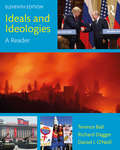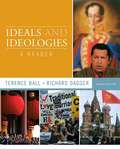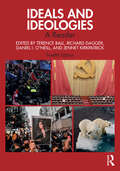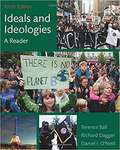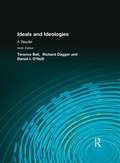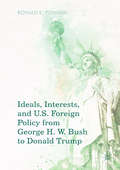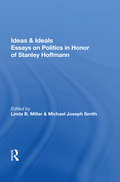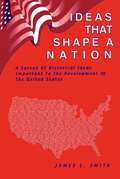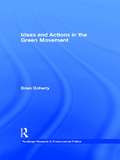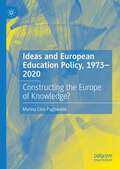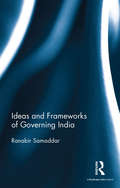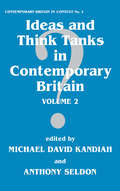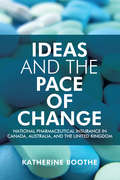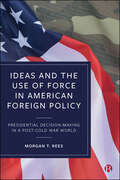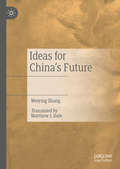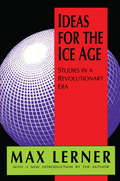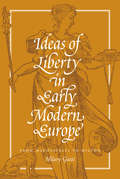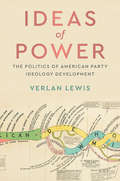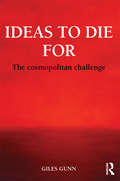- Table View
- List View
Ideals and Ideologies: A Reader
by Terence Ball Richard Dagger Daniel I. O'NeillIdeals and Ideologies: A Reader is a comprehensive compilation of classic and contemporary readings representing all of the major "isms." It offers students a generous sampling of key thinkers in different ideological traditions and places them in their historical and political contexts. Used on its own or with Political Ideologies and the Democratic Ideal, the anthology accounts for the different ways people use ideology and conveys the continuing importance of ideas in politics. New to this 11th Edition: Alexander Keyssar, "Voter Suppression, Then and Now" (a distinguished historian traces the tawdry history of attempts, successful and unsuccessful, to disenfranchise voters). Andrew Sullivan, "Democracies End When They Become Too Democratic" (an eminent conservative commentator and author argues that, under certain circumstances, democracies pose a danger to their very own existence). Timothy Egan, "The Dumbed Down Democracy" (a prominent author and columnist argues that American democracy has been "dumbed down" due, in large part, to the absence of civic education in the public school curriculum). Max Boot and David Brooks, "Conservatives Assess Trump" (two leading contemporary conservatives ponder the fundamental ideological problems the current president poses for the movement, and consider the ways in which Donald Trump is—and isn’t—a true conservative). Eugene V. Debs, "Speech to the Conference for Progressive Political Action" (an early 20th-century American socialist and former presidential candidate articulates his vision for a new workers’ party that would challenge capitalism in the United States). Robert Kagan, "This is How Fascism Comes to America" (a prominent neoconservative historian detects disturbing parallels between the rise of Donald Trump and that of various interwar fascists). Erik Loomis, "A New Chapter in the Black Liberation Movement" (an American historian makes the case for Black Liberation with a particularly compelling case study: how prisoners (mainly black) work essentially as slaves in both public and for-profit prisons in the United States). Black Lives Matter, "A Vision for Black Lives: Demands for Black Power, Freedom & Justice" (leaders of the Black Lives Matter movement set forth their basic ideological beliefs and public policy prescriptions). Josephine Livingstone, "The Task Ahead for Feminism" (the author argues that much remains to be done after the #MeToo movement).
Ideals and Ideologies: A Reader
by Terence Ball Richard DaggerA comprehensive compilation of original readings representing all of the major 'isms, Ideals and Ideologies puts students in touch with the thinkers and ideas that shape the political world.' This reader offers students a generous sampling of key thinkers in different ideological traditions and places them in historical and political context. Used on its own or with Political Ideologies and the Democratic Ideal, Ideals and Ideologies accounts for the different ways people use ideology to interpret change in the world and directly conveys the ongoing importance of ideas in politics.
Ideals and Ideologies: A Reader
by Terence Ball, Richard Dagger, Daniel I. O’Neill, and Jennet KirkpatrickIdeals and Ideologies: A Reader is a comprehensive compilation of classic and contemporary readings representing all major “isms.” It offers students a generous sampling of key thinkers in different ideological traditions and places them in their historical and political contexts. Used on its own or with Political Ideologies and the Democratic Ideal, the anthology accounts for the different ways people use ideology and conveys the continuing importance of ideas to politics.New to this editionThe twelfth edition includes the following additions: Steven Levitsky and Daniel Ziblatt, “How Democracies Die” (two distinguished political scientists delineate the sources of democratic demise). Ayn Rand, “Collectivized Ethics” (a well-known libertarian thinker argues that it is illegitimate for governments to legally mandate behavior that benefits other people). Patrick Deneen, “Aristopopulism” (an influential conservative professor makes the case for a new kind of governing alliance between masses and elites). Herbert Marcuse, “One-Dimensional Man” (a renowned twentieth-century Marxist argues that capitalism creates a set of false needs and beliefs that prevent workers from resisting it). “Patriot Front Manifesto” (an Alt-Right white nationalist group attempts to link their ideology to American history and values). Ta-Nehisi Coates, “The Case for Reparations” (a prominent author argues that Americans should seriously consider what it would take to make amends to Black people for the ongoing effects of slavery, Jim Crow, and other forms of discrimination). Kate Manne, “Ameliorating Misogyny” (a contemporary feminist philosopher redefines misogyny as the central mechanism for governing women’s behavior and upholding patriarchy). Lorna Bracewell, “A Story of Queer Survival” (a lesbian feminist scholar links her personal coming-of-age experiences to the central beliefs of the gay liberation movement). Karla Cornejo Villavicencio, “Waking up from the American Dream” (a Harvard graduate and author who came to the United States as an undocumented immigrant describes the challenges faced by people who do not have the rights and privileges of full citizenship). Pope Francis, “Laudate Deum” (the leader of 1.3 billion Catholics worldwide describes how he believes they, and other people of goodwill, should respond to the increasingly urgent climate crisis). Dave Foreman, “In Defense of Monkeywrenching” (a leading radical environmentalist defends non-violent ecological sabotage as morally and politically legitimate). Sayyid Abu’l-A‘la Mawdudi, “The Islamic Law” (a highly influential South Asian Islamist thinker defines and defends the necessity of shari-‘a for Muslim societies). Hamas, “Charter of the Islamic Resistance Movement of Palestine” (a leading radical Islamist group spells out its core tenets and basic aims at its founding).
Ideals and Ideologies: A Reader (Mypoliscikit Ser.)
by Terence Ball Richard Dagger Daniel I. O'NeillIdeals and Ideologies: A Reader is a comprehensive compilation of classic and original readings representing all of the major 'isms'. It offers students a generous sampling of key thinkers in different ideological traditions and places them in their historical and political contexts. Used on its own or with Political Ideologies and the Democratic Ideal, the title accounts for the different ways people use ideology and conveys the ongoing importance of ideas in politics. NEW TO THIS EDITION Paul Krugman, "The Conscience of a Liberal" (A distinguished Nobel Laureate's defense of liberalism as a kind of rational conservatism, inasmuch as it seeks to conserve the gains and reforms of the New Deal and the Great Society - Social Security, Medicare, minority voting rights, environmental protection, and more.) Robert George, et al., "Manhattan Declaration: A Call of Christian Conscience" (The authors and signers of this 2009 declaration contend that the secularizing of America has gone too far and that Christians must work to reverse this trend.) Bernie Sanders, "On Democratic Socialism in the United States" (The fiery former candidate for the 2016 Democratic presidential nomination, who calls himself a "democratic socialist," offers an unapologetic defense of his creed.) bell hooks, "Feminism is for Everybody" (A distinguished feminist theorist and author argues that feminism isn't only for or about women, but benefits everyone.) Val Plumwood, "Feminism and the Mastery Nature" (An eminent Australian ecofeminist emphasizes what feminists bring to the debate over human beings' role and relationship with nature.) Vine Deloria, Jr., "On Liberation" (A prominent Native American author and thinker outlines his vision of native people's liberation.) Pope Francis, "Laudato Si': On Care for our Common Home" (The current Pope's pleas for Christians and others to address climate change and other environmental issues.) Abu Bakr al-Baghdadi, "Declaration of a Caliphate" (The radical Islamist leader or caliph of Islamic State [ISIS] announces the creation of a spiritual and geographic home for all "true" Muslims.)
Ideals and Ideologies: A Reader 9th Revised edition
by Terence Ball Richard Dagger Daniel I. O'NeillIdeals and Ideologies: A Reader is a comprehensive compilation of classic and original readings representing all of the major 'isms'. It offers students a generous sampling of key thinkers in different ideological traditions and places them in their historical and political contexts. Used on its own or with Political Ideologies and the Democratic Ideal, the title accounts for the different ways people use ideology and conveys the ongoing importance of ideas in politics. NEW TO THIS EDITION Paul Krugman, "The Conscience of a Liberal" (A distinguished Nobel Laureate's defense of liberalism as a kind of rational conservatism, inasmuch as it seeks to conserve the gains and reforms of the New Deal and the Great Society - Social Security, Medicare, minority voting rights, environmental protection, and more.) Robert George, et al., "Manhattan Declaration: A Call of Christian Conscience" (The authors and signers of this 2009 declaration contend that the secularizing of America has gone too far and that Christians must work to reverse this trend.) Bernie Sanders, "On Democratic Socialism in the United States" (The fiery former candidate for the 2016 Democratic presidential nomination, who calls himself a "democratic socialist," offers an unapologetic defense of his creed.) bell hooks, "Feminism is for Everybody" (A distinguished feminist theorist and author argues that feminism isn't only for or about women, but benefits everyone.) Val Plumwood, "Feminism and the Mastery Nature" (An eminent Australian ecofeminist emphasizes what feminists bring to the debate over human beings' role and relationship with nature.) Vine Deloria, Jr., "On Liberation" (A prominent Native American author and thinker outlines his vision of native people's liberation.) Pope Francis, "Laudato Si': On Care for our Common Home" (The current Pope's pleas for Christians and others to address climate change and other environmental issues.) Abu Bakr al-Baghdadi, "Declaration of a Caliphate" (The radical Islamist leader or caliph of Islamic State [ISIS] announces the creation of a spiritual and geographic home for all "true" Muslims.)
Ideals, Interests, and U.S. Foreign Policy from George H. W. Bush to Donald Trump
by Ronald E. PowaskiThis volume discusses the presidential foreign policies of the post–Cold War era, beginning with George H. W. Bush and ending with the first 17 months of Donald Trump’s presidency. During this period, the United States emerged from the Cold War as the world’s most powerful nation. Nevertheless, the presidents of this era faced a host of problems that tested their ability to successfully blend realism and idealism. Some were more successful than others.
Ideas And Ideals: Essays On Politics In Honor Of Stanley Hoffmann
by Stanley HoffmannThis rich collection of original essays pays tribute to Stanley Hoffmann, a preeminent scholar of international relations and French politics who has inspired former students to explore the links between domestic society and foreign policy and between theory and practice. In two autobiographical chapters, Hoffmann traces his personal odyssey from F
Ideas That Shape A Nation: Historical Ideas Important To The Development Of The United States
by James L. SmithIdeas That Shape a Nation presents historical ideas in the original words of persons who influenced the development of the United States government, its laws, economic system, and social movements. The book is based on the premise that history is more than a mere chronicle of what people did; it is also an examination of what people thought.
Ideas and Actions in the Green Movement (Environmental Politics #Vol. 2)
by Brian DohertyThe 'Western' green movement has grown rapidly in the last three decades: green ministers are in government in several European countries, Greenpeace has millions of paying supporters, and green direct action against roads, GM crops, the WTO and neo-liberalism, have become ubiquitous.The author argues that 'greens' share a common ideological framework but are divided over strategy. Using social movement theory and drawing on research from many countries, he shows how the green movement became more differentiated over time, as groups had to face the task of deciding what kind of action was appropriate.In the breadth of its coverage and its novel focus on the relationship between green ideas and action, this book makes an important contribution to the understanding of green politics.
Ideas and European Education Policy, 1973-2020: Constructing the Europe of Knowledge?
by Marina Cino PagliarelloThis book analyses the transformation of European Education Policy from 1973 to 2020. In doing so, it offers a unique insight into the changes of European education from a predominantly national concern to a supranational policy framework, driven by an economic discourse concerning productivity and employability. The book shows that the idea of the “Europe of Knowledge” did not originate in the Lisbon Strategy of 2000, but rather was the result of a gradual development that started in the mid-1980s. This begun with the establishment of a specific problem definition of education as a solution for Europe’s lack of competitiveness, a definition that was incrementally constructed by the European Commission and the European business community. Highlighting significant and unexplored questions such as the role of European transnational business in education and the role of the “problem entrepreneur” in defining policy issues, this book will provide a comprehensive perspective on European Education Policy that will be of interest to all students of European Politics, Education Policy, and Public Policy.
Ideas and Frameworks of Governing India
by Ranabir SamaddarIdeas and Frameworks of Governing India and its companion volume Neo-liberal Strategies of Governing India tell the story of governance in independent India and address the critical question: how is a post-colonial democracy governed? Further, they attempt to understand why the process of governing a post-colonial democracy, particularly in the neo-liberal age, should be studied as the central question within the history of post-colonial democracy. The volumes offer hitherto unexplored analyses of governance — political and ideological aspects along with technological characteristics — in a historical framework. This volume discusses: ideas and issues at the core of governance in post-colonial India constitution, state-making and government formation the asymmetrical nature of the anti-colonial foundations of governance In breaking new ground in the study of what constitutes the political subject, these volumes will be indispensable to scholars, researchers and students of politics, public administration, development studies, South Asian studies and modern India.
Ideas and Think Tanks in Contemporary Britain: Volume 1
by Micheal David Kandiah Antony SeldonThis study looks at the influence of ideas and think tanks in Britain, contemplating how ideas have shaped politics and society. The purveyors of ideas for change - the think tanks - are examined, and academics and participants vieww are recorded in a number of interviews.
Ideas and Think Tanks in Contemporary Britain: Volume 2
by Anthony Seldon Michael David KandiahThis study looks at the influence of ideas and think tanks in Britain, contemplating how ideas have shaped politics and society. The purveyors of ideas for change - the think tanks - are examined, and academics and participants views are recorded in a number of interviews.
Ideas and the Pace of Change
by Katherine BootheCanada is the only OECD country that has universal, comprehensive public hospital and medical insurance but lacks equivalent pharmaceutical coverage. In Ideas and the Pace of Change, Katherine Boothe explains the reasons for this unique situation. Using archival, interview, and polling data, Boothe compares the policy histories of Canada, the United Kingdom, and Australia in order to understand why Canada followed a different path on pharmaceutical insurance.Boothe argues that pace matters in policy change. Quick, radical change requires centralized political institutions, an elite consensus, and an engaged, attentive electorate. Without these prerequisites, states are far more likely to take a slower, incremental approach. But while rapid policy change reinforces the new consensus, incremental progress strengthens the status quo, letting development stall and raising the bar for achieving change.An important contribution to the study of comparative political economy, Ideas and the Pace of Change should be required reading for anyone seeking to understand why health care reforms succeed or fail.
Ideas and the Use of Force in American Foreign Policy: Presidential Decision-Making in a Post-Cold War World
by Morgan ReesThe decision to mount an armed foreign intervention is one of the most consequential that a US president can take. This book sets out to explain why and when presidents choose to use force. The book examines decisions to use force throughout the post-Cold War period, via flashpoints including the Balkans, the ‘War on Terror’ and the Middle East. It develops new explanations for variation in the use of force in US foreign policy by theorizing and demonstrating the effects of the displacement and repression of ideas within and across different US presidential administrations, from George H.W. Bush to Donald Trump. For students, scholars and anyone with an interest in international relations and global security, this book is an original perspective on a defining issue of recent decades.
Ideas for China’s Future
by Weiying ZhangThis book attempts to convey that ideas matter and China needs right ideas to defeat wrong ideas and to guide its future reform. The successes that China has accomplished over the last 40 years of reform and opening were the result of ideas defeating interests. After the end of the “Cultural Revolution,” Deng Xiaoping initiated market-oriented Reform and Opening because he had new ideas. While China has made great progress in both economic and social development since the beginning of reform and opening, there is still a long way to go to become a liberal society. Although the ideas of political leaders are crucial in the short term for social transformation to take place, the ideas of the common people play a more important role in the long term. The types of new ideas that China needs are proposed in this book.
Ideas for the Ice Age: Studies in a Revolutionary Era
by Max LernerIdeas for the Ice Age is a companion volume to Max Lerner's classic work Ideas Are Weapons. Both were written mostly in the 1930s, as products of a period when the democratic idea was under heavy siege from totalitarian ideologies of the right and left., In its focus, Ideas for the Ice Age is a study of the task of democracy in a revolutionary era, an enterprise that has taken on new urgency in the post-Communist world. For Lerner this task comprises four aspects around which the book is organized: the task of winning the future for American democracy, and planning its organization; the problem of selecting out those elements of a usable past which, when strengthened and extended, can assure a livable future; the problem of acting decisively in moments of international crisis; and the problem of strengthening democracy at home and completing its unfinished business., Within this framework, Lerner selects ideas and personalities that have decisively shaped the modern mind. The selections have lost none of their original timeliness. Among the wide range of figures considered here are Machiavelli, Franz Kafka, Randolph Bourne, Harold Laski, John Strachey. and Justice Oliver Wendell Holmes. Lerner reflects as well on the offices, institutions, and constitutional questions of American democracy in moments of historical crisis. For a new generation of readers, this gallery of thinkers will be essential reading, a must for students of American studies, the history of ideas, and political theory.
Ideas in Context: Enlightenment and Utility
by Emmanuelle De ChampsJeremy Bentham, the founder of classical utilitarianism, was a seminal figure in the history of modern political thought. This lively monograph presents the numerous French connections of an emblematic British thinker. Perhaps more than any other intellectual of his time, Bentham engaged with contemporary events and people in France, even writing in French in the 1780s. Placing Bentham's thought in the context of the French-language Enlightenment through to the post-Revolutionary era, Emmanuelle de Champs makes the case for a historical study of 'Global Bentham'. Examining previously unpublished sources, she traces the circulation of Bentham's letters, friends, manuscripts, and books in the French-speaking world. This study in transnational intellectual history reveals how utilitarianism, as a doctrine, was both the product of, and a contribution to, French-language political thought at a key time in European history. The debates surrounding utilitarianism in France cast new light on the making of modern Liberalism.
Ideas in Context: Free Trade and Its Enemies in France, 1814–1851
by David ToddIn the aftermath of the French Revolution, advocates of protection against foreign competition prevailed in a fierce controversy over international trade. This groundbreaking study is the first to examine this 'protectionist turn' in full. Faced with a reaffirmation of mercantile jealousy under the Bourbon Restoration, Benjamin Constant, Jean-Baptiste Say and regional publicists advocated the adoption of the liberty of commerce in order to consolidate the new liberal order. But after the Revolution of 1830 a new generation of liberal thinkers endeavoured to reconcile the jealousy of trade with the discourse of commercial society and political liberty. New justifications for protection oscillated between an industrialist reinvention of jealousy and an aspiration to self-sufficiency as a means of attenuating the rise of urban pauperism. A strident denunciation of British power and social imbalances served to defuse the internal tensions of the protectionist discourse and facilitated its dissemination across the French political spectrum.
Ideas in Context: The Crisis of German Historicism
by Liisi KeedusHannah Arendt and Leo Strauss - two major political thinkers of the twentieth century, both of German-Jewish background and forced into exile in America - were never friends or intellectual interlocutors. Yet they shared a radical critique of contemporary idioms of politically oriented discourses and a lifelong effort to modify reflective approaches to political experience. Liisi Keedus reveals how Arendt's and Strauss's thinking about political modernity was the product of a common intellectual formation in Weimar Germany, by examining the cross-disciplinary debates guiding their early work. Through a historical reconstruction of their shared interrogative horizons - comprising questions regarding the possibility of an ethically engaged political philosophy after two world wars, the political fate of Jewry, the implications of modern conceptions of freedom, and the relation between theoria and praxis - Keedus unravels striking similarities, as well as genuine antagonisms, between the two thinkers.
Ideas in Context: The Scottish Enlightenment and the French Revolution
by Anna PlassartHistorians of ideas have traditionally discussed the significance of the French Revolution through the prism of several major interpretations, including the commentaries of Burke, Tocqueville and Marx. This book argues that the Scottish Enlightenment offered an alternative and equally powerful interpretative framework for the Revolution, which focused on the transformation of the polite, civilised moeurs that had defined the 'modernity' analysed by Hume and Smith in the eighteenth century. The Scots observed what they understood as a military- and democracy-led transformation of European modern morals and concluded that the real historical significance of the Revolution lay in the transformation of warfare, national feelings and relations between states, war and commerce that characterised the post-revolutionary international order. This book recovers the Scottish philosophers' powerful discussion of the nature of post-revolutionary modernity and shows that it is essential to our understanding of nineteenth-century political thought.
Ideas of Liberty in Early Modern Europe
by Hilary GattiEurope's long sixteenth century--a period spanning the years roughly from the voyages of Columbus in the 1490s to the English Civil War in the 1640s--was an era of power struggles between avaricious and unscrupulous princes, inquisitions and torture chambers, and religious differences of ever more violent fervor. Ideas of Liberty in Early Modern Europe argues that this turbulent age also laid the conceptual foundations of our modern ideas about liberty, justice, and democracy.Hilary Gatti shows how these ideas emerged in response to the often-violent entrenchment of monarchical power and the fragmentation of religious authority, against the backdrop of the westward advance of Islam and the discovery of the New World. She looks at Machiavelli's defense of republican political liberty, and traces how liberty became intertwined with free will and religious pluralism in the writings of Luther, Erasmus, Jean Bodin, and Giordano Bruno. She examines how the St. Bartholomew's Day Massacre and the clash of science and religion gave rise to concepts of liberty as freedom of thought and expression. Returning to Machiavelli and moving on to Jacques Auguste de Thou, Paolo Sarpi, and Milton, Gatti delves into debates about the roles of parliamentary government and a free press in guaranteeing liberties.Drawing on a breadth of canonical and lesser-known writings, Ideas of Liberty in Early Modern Europe reveals how an era stricken by war and injustice gave birth to a more enlightened world.
Ideas of Power in the Late Middle Ages, 1296–1417
by Joseph CanningThrough a focused and systematic examination of late medieval scholastic writers - theologians, philosophers and jurists - Joseph Canning explores how ideas about power and legitimate authority were developed over the 'long fourteenth century'. The author provides a new model for understanding late medieval political thought, taking full account of the intensive engagement with political reality characteristic of writers in this period. He argues that they used Aristotelian and Augustinian ideas to develop radically new approaches to power and authority, especially in response to political and religious crises. The book examines the disputes between King Philip IV of France and Pope Boniface VIII and draws upon the writings of Dante Alighieri, Marsilius of Padua, William of Ockham, Bartolus, Baldus and John Wyclif to demonstrate the variety of forms of discourse used in the period. It focuses on the most fundamental problem in the history of political thought - where does legitimate authority lie?
Ideas of Power: The Politics of American Party Ideology Development
by Verlan LewisThis groundbreaking book challenges the dominant view of ideology held by both political scientists and political commentators. Rather than viewing ideological constructs like liberalism and conservatism as static concepts with fixed and enduring content, Professor Verlan Lewis explains how the very meanings of liberalism and conservatism frequently change along with the ideologies of the two major parties in American politics. Testing a new theory to help explain why party ideologies evolve the way that they do, this book traces the history of American political parties from the Hamiltonian Federalists and Jeffersonian Republicans of the 1790s to the liberal Democrats and conservative Republicans of today. Ideas of Power shows us how changing party control of government institutions, such as Congress, the presidency, and the Supreme Court, influences how party ideologies develop.
Ideas to Die For: The Cosmopolitan Challenge
by Giles GunnCosmopolitanism and Its Discontents seeks to address the kinds of challenges that cosmopolitan perspectives and practices face in a world organized increasingly in relation to a proliferating series of global absolutisms – religious, political, social, and economic. While these challenges are often used to support the claim that cosmopolitanism is impotent to resist such totalizing ideologies because it is either a Western conceit or a globalist fiction, Gunn argues that cosmopolitanism is neither. Situating his discussion in an emphatically global context, Gunn shows how cosmopolitanism has been effective in resisting such essentialisms and authoritarianisms precisely because it is more pragmatic than prescriptive, more self-critical than self-interested and finds several of its foremost recent expressions in the work of an Indian philosopher, a Palestinian writer, and South African story-tellers. This kind of cosmopolitanism offers a genuine ethical alternative to the politics of dogmatism and extremism because it is grounded on a new delineation of the human and opens toward a new, indeed, an "other," humanism.
